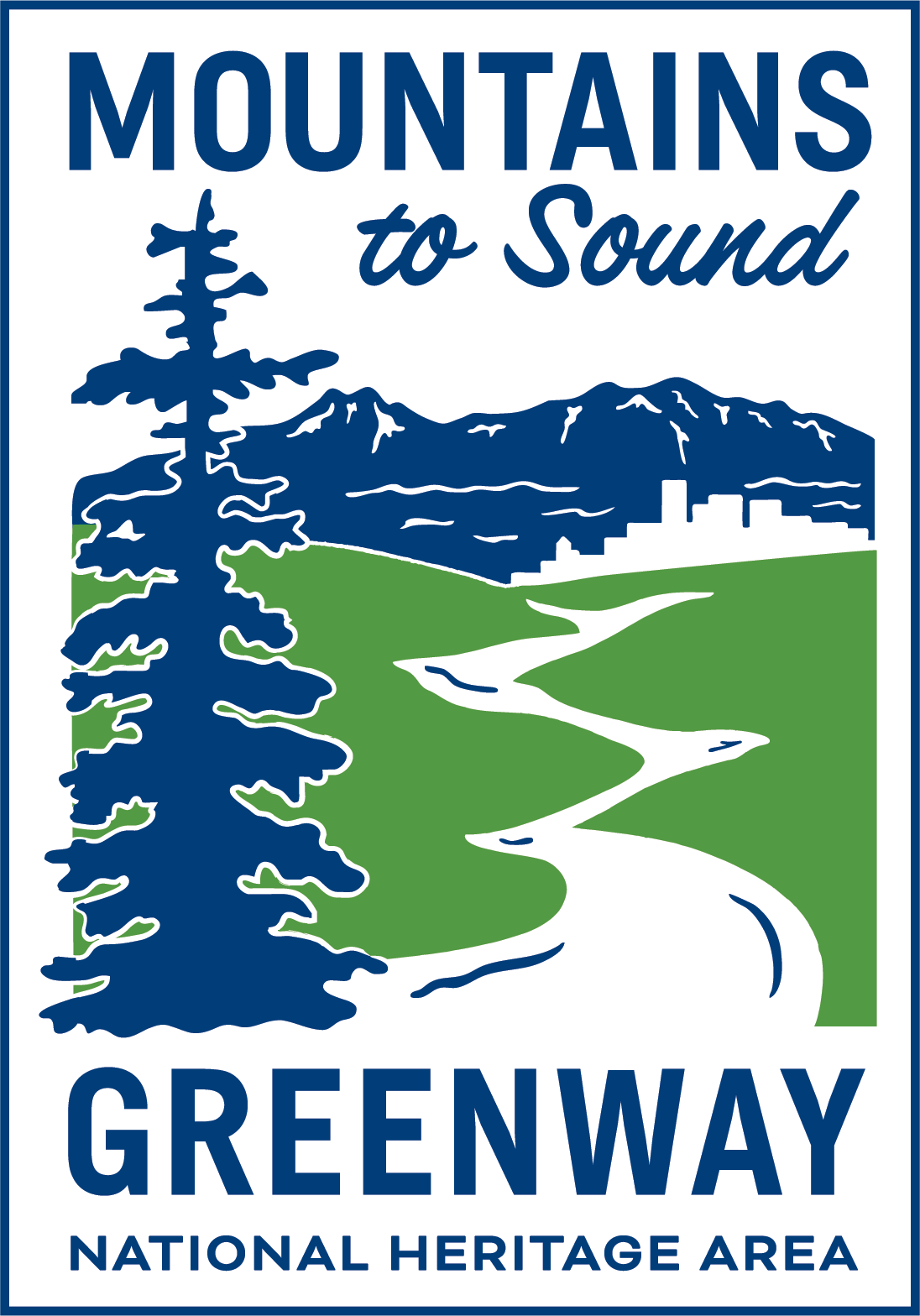Kickstart Your Green Career With Tips From Young Leaders Who Are Working To Make the World a Better Place
If you are a high school student who is interested in environmental issues but you aren’t sure how to level up your skills toward an impactful role, you are not alone.
Navigating towards a future career can be overwhelming, especially within the environmental sector where various career paths are still being created. Within this rapidly expanding industry, many opportunities are available at nonprofits, government agencies, and community organizations for those passionate about sustainability, climate change, clean air, and water. Dozens of students have made their way towards a more verdant career path through the Clean Water Ambassadors Internship program, which is a great way to get started on your journey toward a green career that makes a real contribution to the environment.
We gathered insights from four budding environmental leaders who got their start in the program. Though they all chose different paths, each is using the skills they acquired from the program to have a positive impact. Benjamin Kim is working towards environmental public health as a research assistant while Risa Suho is co-creating a start-up to help marginalized communities attain affordable solutions to urban stormwater issues. We’ll also hear from Nha Khuc and Angela Rosengreen, who each have unique perspectives and experiences in the worlds of restoration and green infrastructure.
With hands-on experience in environmental conservation and sustainability, they each gained professional skills while tackling real-world projects that promote environmental justice within their communities. The program helped them gain valuable skills and knowledge that will be useful in their future careers within the realms of conservation, restoration, medicine, and city infrastructure. Internships like the Clean Water Ambassador Program pave the way for future environmental leaders to care for habitats and communities within the Mountains to Sound Greenway and beyond.
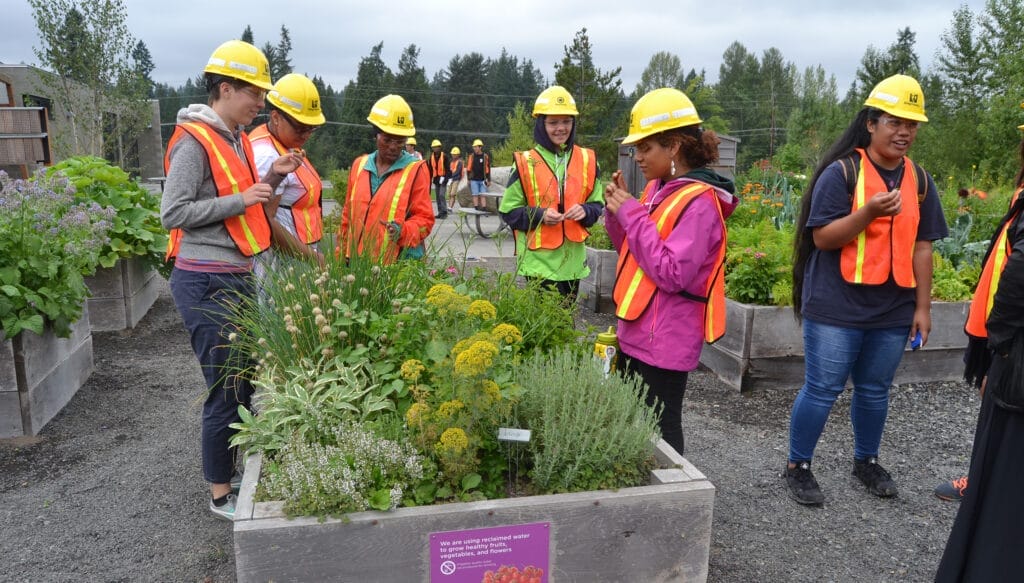
Nha Khuc – Green Builder
Nha Khuc (she/her) is in her second year at the University of Washington in an environmental studies program. She recently applied to the Community Environment and Planning program with the hopes of double majoring so that she can focus on how to build a community that evolves around green infrastructure. She loves being able to project manage as an intern with King County Solid Waste, where she makes sure equity and justice are at the core of infrastructure projects around the area.
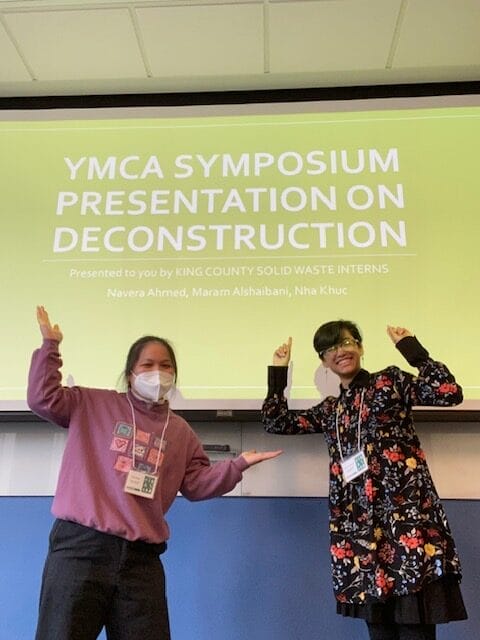
Q: What do you do at your current internship with King County Solid Waste?
A: I work in the recycling and environmental services section, and I work on different projects with different project managers. Recently, I have been working on reviewing the ESJ credits and the scorecards for the green building team. The ESJ is equity and social justice credits that we hope the project managers will apply to their capital projects. I also worked with my co-interns to present about deconstruction and reusing building materials at the YMCA Environmental Symposium last March. It’s remote work so it’s more convenient for me during the school year.
Q: What inspired you to apply to the Clean Water Ambassadors internship?
A: I was born and raised in Vietnam, and I moved here when I was 10 years old in 2013. Back in Vietnam, we lived in the city so I didn’t have much interaction with nature. It would take a long time for me to commute to where we can go hiking. When I first came here, I felt like I was more connected to the outdoors. That’s when I started focusing on environmental topics. In my freshman year of high school, one of my friends was enrolled and she was telling me about all the internships she went on and I thought it was very interesting. I never thought about where all the wastewater that comes from my house goes to.
Q: Was there a topic in the internship that sparked a deep interest that made you want to pursue it as a career?
A: When we talked about environmental justice and social justice it was at the beginning of our internship. Those were the topics that opened a new topic that I could explore. In Vietnam, I was also facing environmental injustice. I was living near a river that was full of trash. Learning about the term and recognizing that from my own experience was very powerful to me and inspired me to do all the following opportunities with a focus on equity as well. That was the beginning of how I started getting into focusing more on environmental justice and social justice.
Q: When was the first time you were able to apply environmental justice to your work?
A: In my senior year of high school, we recognized that my school was so different from North Seattle where they have resources. They all have some sort of green infrastructure at their school. When I did research into my school district, Highline School District, none of the schools in the district had any kind of green infrastructure, except for one. That was a major shock to me. I recognized the difference or the gap from North Seattle to South Seattle. When we recognized that, I started the Highline High School Solar Panel Project where I tried to promote and encourage the school officials to install solar panels for our school. We worked on that project for two years, and the solar panels were installed in the fall of 2022.
Q: How did you apply your knowledge to make the project equitable?
A: We tried to encourage them to include languages that bring more bidders from women and minority businesses and engineers who focus on equity as well. I got that exposure of what it looks like to apply equity to small aspects of the project. Equity should be at the core of every project, it’s not something you add on to the end to be equitable.
Q: What would you tell someone who is interested in planning a career in this field?
A: The first step would be finding an internship in their area that they would be interested in joining or researching different topics. I think it’s important to filter out the issues that are really important and relevant to their life experience because it helps them connect more with the people they work with and just have an open mind when they go into new experiences with new internships. Having an experience where you can talk to other professionals in the field is really important.
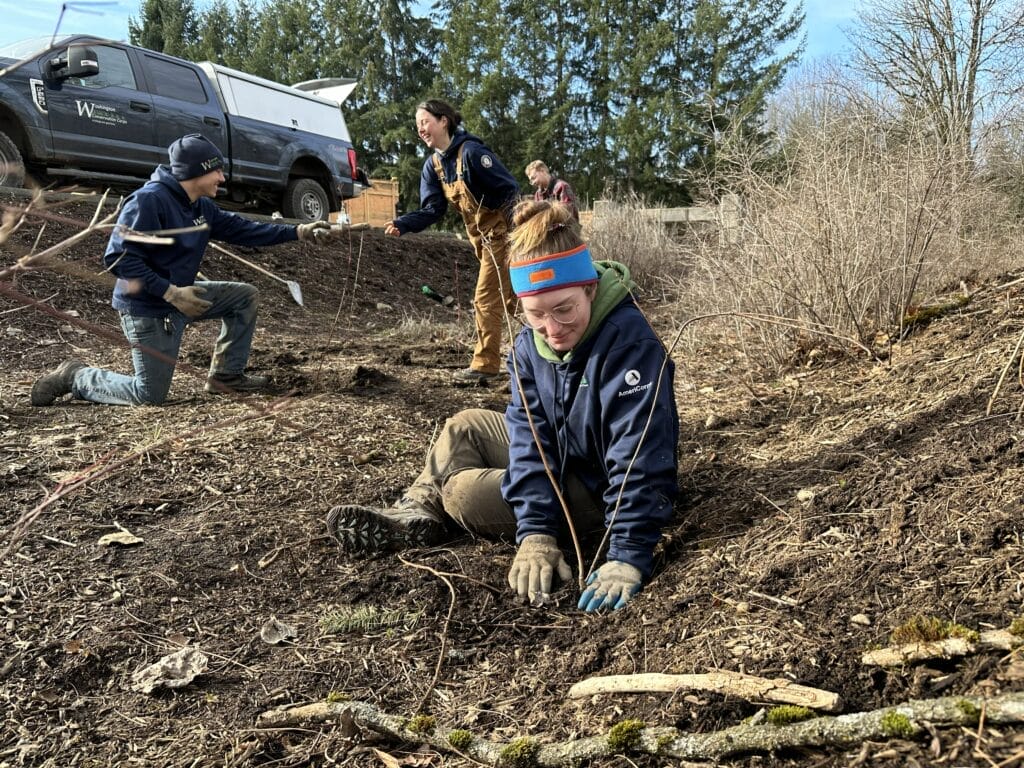
Angela Rosengreen – Habitat Restorer
Angela Rosengreen (she/they) is looking forward to applying to the University of Washington to enter an environmental program. In the meantime, they are connecting with the community through restoration and trail-building as a Spike Crew Assistant Supervisor with King County.
Q: What led you to your current role?
A: I really love environmental science but the pandemic slowed my row on jumping back into what I love, especially after my Clean Water Ambassadors Internship. I had a buddy who joined crew and I was hesitant at first, but one day I realized I had to do it because this is what I love.
Q: What led you to that understanding that you would love to do conservation/restoration work?
A: During Clean Water Ambassadors, we got to work outside and connect with community members. Working for WCC, I’m able to have impacts on communities I didn’t even know about.
Q: What kind of work are you doing to improve those communities?
A: We got to do restoration at Seahurst Park in Burien after a mudslide, it was really hard work because we had to get strapped up on the rope, anchored to a tree, and we would have to climb and remove invasive plants and noxious weeds and replant native plants. That was super hard but it was an amazing experience. We helped fix this mudslide and now, hopefully, the park is a little bit safer, and hopefully, the plants take and keep it stable.
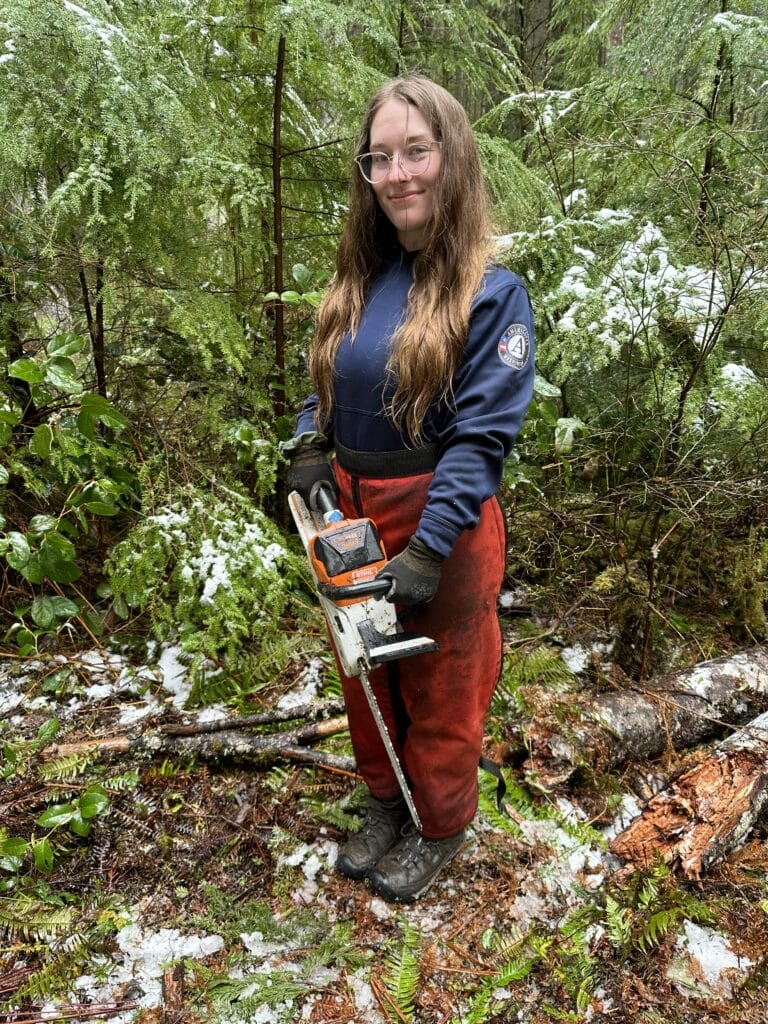
Q: What inspired you to become a Clean Water Ambassador?
A: When I was 15, on one of our field trips, we went to the wastewater treatment facility in Renton, and I was just absolutely amazed by how our water is cleaned. I was like, “I have to do this.” Because of that, we got to learn about the Clean Water Ambassadors Internship. The first time I applied, I didn’t get it and I was heartbroken. I tried it again, and I got it in my second year.
Q: Was there anything you learned during the internship that changed your career prospects?
A: A big thing that I took away from the internship was equity, community, and environmental racism. I came back with an understanding that I can be a change that I would like to see and that I don’t have to leave it to other people. I got to meet so many younger women and non-binary folks who I saw myself in, and I was like, “Oh wait, this field isn’t just for old men…there are people who look just like me.”
Q: Did the internship give you any insight into where you thought you might end up?
A: It almost gave me too much of an insight and opened so many doors. I could work in soil science, in wastewater management, or I could be an outdoor educator. It definitely gave me a lot of paths to think about. I was pretty dead set on attending the University of Washington right after, but I had a lot of roadblocks that stopped me from doing that. After my AmeriCorps terms, with the education award they granted me, I should be able to fulfill that dream.
Q: Where do you want your path to take you past this current role?
A: I plan on doing another term to get two education awards, so after this, I plan on going back to the University of Washington to get an environmental sciences degree. One thing I learned in my Clean Water Ambassador time is that a lot of the professionals we interviewed had a degree in something, but they were doing something completely different. So, I’m not too worried about getting the perfect degree. As long as I put in the work to show who I am, I can venture into whatever falls into my lap.
Q: What would you tell a young person who wants to get their foot in the door of conservation?
A: I know this work seems intimidating, but there are so many people who are so kind in this line of work who want you to succeed because they understand that environmental work is so important and only going to get bigger.
Risa Suho – Stormwater Champion
Risa Suho (she/they) is a former Clean Water Ambassador who created Kent Meridian High School’s first rain garden. They served as a Sustainability Ambassador for World Relief and are a current intern with Seattle Public Utilities in the Solid Waste Division where they focus on community outreach while learning about recycling and composting systems. As a senior at the University of Washington, she is excited to graduate from the College of Environment and use her start-up to clean up stormwater with moss-based infrastructure. Her interest in stormwater treatment began inside a stormwater pipe big enough to hold her and several fellow Water Ambassadors. It was there she realized just how much stormwater flows through urban environments, and ultimately the ocean.
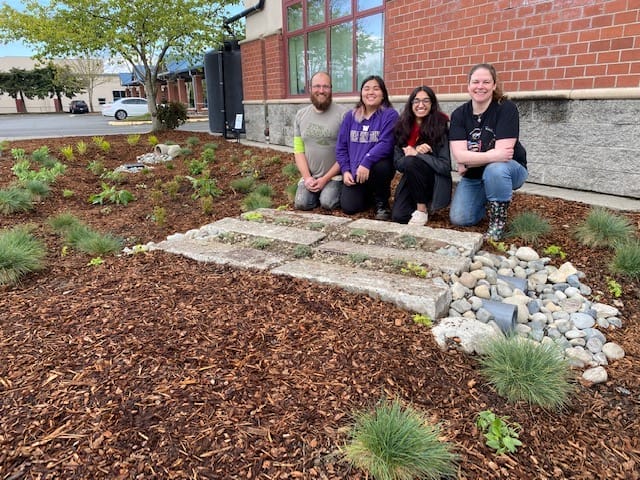
Q: How did the Clean Water Ambassadors Internship lead you to project manage a student-led rain garden at your high school?
A: When I started the internship, I was a junior in high school and I retained my internship until my senior year. That’s when I started the project to write a grant for this nice rain garden and cistern at the Kent Meridian high school that I was attending. It began with Becca Kedenburg asking me to demonstrate what I had learned throughout the internship. I’m so passionate about stormwater, so Becca connected me with Jo Sullivan. At the time, she was the acting manager for the RainWise program. The RainWise program specializes in rebates and establishing rain gardens and other forms of green stormwater infrastructure.
Q: What was it like undertaking this 2-year-long project as a high school student?
A: Most projects usually end within a year but a big part of the reason why I was working on it for so long was because of the pandemic, and the fact that bureaucracy is very quirky. I sat there with a chain of 15 emails asking for the same thing. I think we had a whole party bus full of people by the time we got permission to install this rain garden.
While this was happening, I was still very involved in the High school Environmental Club. I already hired a contractor at that point. We had an idea of what we wanted, when we wanted to do it by, but the biggest problem was getting permission to do it. The summer of 2019, which is also the year I graduated from my high school, is when I found out that the school would be awarded $35,000 from the Water Works Grant.
While this process is happening, that’s when I started my freshman year at the University of Washington. It was in between my junior year when the rain garden was finally built.
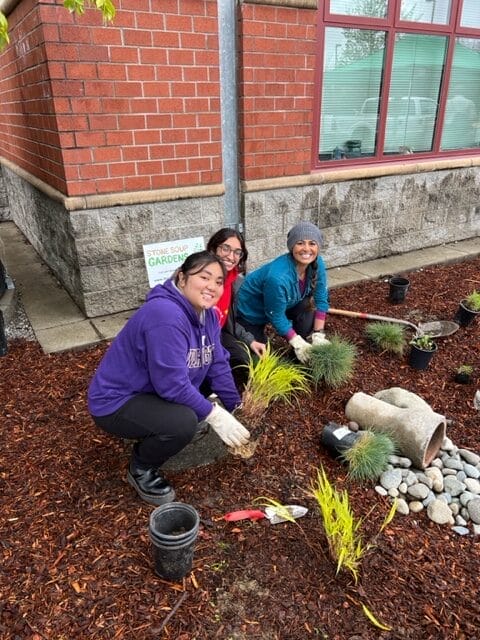
Q: How did the internship prepare you for the RainWise Garden project?
A: One was public speaking skills. When you’re a teenager, there’s nothing you hate more than talking in front of a group of strangers. So that’s exactly what they had us do at the internship. We were consistently trained in public speaking on different occasions. I had to use those public speaking skills because you can’t just ask for permission from the school board, your local city government, the civil engineers without having a little bit of those skills, right?
Two was prior knowledge of water systems and water management within King County. The location of this rain garden that I wanted to propose at the school falls under King County’s jurisdiction. So fortunately, by going to the water treatment plants, I was essentially able to paint a really good story with a solid foundation of context. I also continued to speak publicly with the Green Infrastructure Summit and at other events, discussing the importance of green stormwater infrastructure in urban environments, especially to youth and communities of color.
Q: What other skills did you learn through the internship?
A: I think this internship helped me a lot more in terms of my life. Professional writing skills, my professional speaking skills, acclimating to professional environments, knowing how to conduct myself. This internship was the first paid position I ever got.
Q: What inspired you to work on projects related to stormwater issues?
A: The internship was a big part of what even inspired me to invest in green stormwater infrastructure. Even to this day, I say this internship was a pivotal moment in my education and professional career. So, the first time I was actually really invested in the content, like really for what it was specifically a tour of the Brightwater Treatment Plant.
Q: What stood out to you about the way this internship works?
A: I think the focus on diversity does truly help a lot. To include young students from these communities who would not have otherwise had any access to the resources or knowledge that they offered does make a really big difference. I think with my experience as a person of color, as an immigrant, that there’s a focus on supporting marginalized communities, but then with this broader knowledge of sustainable systems, then comes the realization that these systems exist and marginalized communities are disproportionately underserved, it’s just how the system was purposely built.
Q: Tell me about the green infrastructure startup you are co-creating.
A: Our startup idea is a product. It’s a form of green stormwater infrastructure that’s essentially a patch of moss that lays on top of concrete rather than having to be built in the ground. It’s meant to be placed in the pathway of stormwater as stormwater heads toward storm drains. This is a more affordable solution for a lot more communities who can’t afford to take the time to build those larger structures. We’ve gotten a lot of support from different accelerator groups and UW itself.
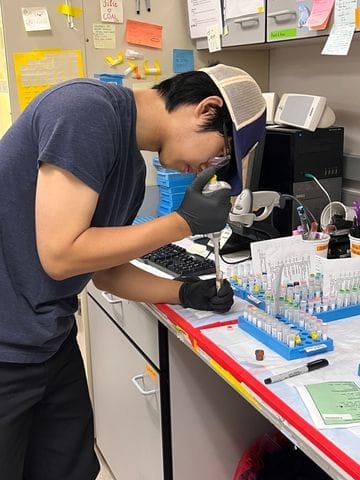
Benjamin Kim – Environmental Health Researcher
Benjamin Kim (he/him) is a junior at the University of Washington with a major in environmental health in the School of Public Health. He currently works as a research assistant at the Pacific Northwest Research Institute and hopes to apply environmental justice to his work in public health.
Q: What surprised you about the internship?
A: I thought we were just going to learn about how to keep our water clean, but it was so much more than that because they really run with the environmental justice aspect of it which I was really interested in after the internship, and I’ve carried that through my college experience as well.
Q: What was a skill you gained that you felt you really needed?
A: I think before this internship, I wanted a really quiet job where I was more to myself but, during this internship, we did so many public speaking workshops that I was really unfamiliar with. I was put into a very uncomfortable position, but I feel like I really needed that because, towards the end of the program, we were supposed to give a presentation to the entire department. With all the skill sets that I gained through those weeks, it wasn’t as frightening as I thought it would be. It’s something that’s a lot easier now; I feel a lot more confident.
Q: What was an impactful moment you experienced during the Clean Water Ambassadors Internship that stuck with you?
A: I remember it was James Rasmussen, he was the Duwamish River coalition leader, and he was telling us that when it comes to community projects, it’s important to just listen, instead of implementing your own projects without input. And that’s something I also want to reflect it in my future work as a research assistant because I feel like in a lot of research, there’s a lot boundaries that are crossed within the communities, and they aren’t given enough input.
Q: How do you want to apply what you learned in your career in environmental health?
A: Combining my passion for the technical side of laboratory work with social justice, that’s something I want to connect in a future job. That was one of the big takeaways from the Clean Water Ambassadors program.
Learn more about the Clean Water Ambassadors Internship and help support the future of the Greenway Trust’s Internship Program! Every donation makes a big difference!
